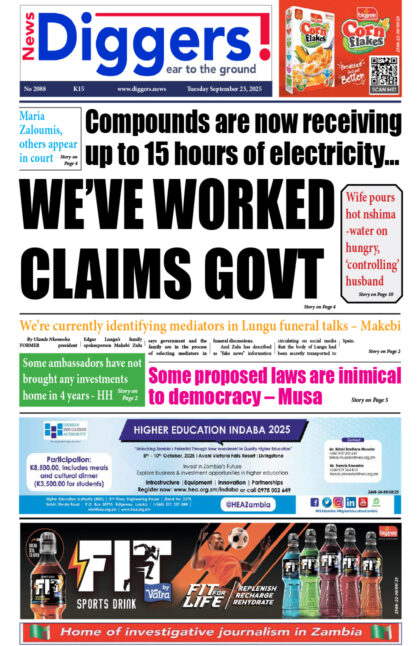ZESCO Limited says electricity connection charges have not been increased but that the company has just reverted to using non subsidised rates in order to prevent the accumulation of a backlog of connections.
And the company says the standard connection fees have been halted until the Energy Regulation Board revisits the same.
In a statement, Tuesday, the company said the articles which constitute the derivation of the connection fees shall be reviewed on a quarterly basis.
“ZESCO Limited has continued to use market reflective fees for all new electricity connections to provide an effective and efficient service to its customers. The said connection fees have neither been increased nor changed but are market driven as has been the case for all non-standard connections. This is in contrast to the media circulation that connection fees have been increased. For a long time, ZESCO Limited has been using predefined subsidized rates which have not been cost reflective and hence the company seeks to prevent the accumulation of a backlog of connections on account of the associated costs. With this noted the standard connection fees have been halted until Energy Regulation Board revisits the same. We wish to advise that the articles that constitute the derivation of the connection fees shall be reviewed on a quarterly basis,” the statement read in part.
Meanwhile, in a memo dated 10 February 2022 addressed to Chief Planning Engineers, ZESCO Director Planning and Projects Gyvaira Bwalya announced the suspension of issuance of quotations effective 27 December 2021.
“Management suspended the issue of quotations on 27 December 2021. This was done in order to systematically manage the connection backlog which currently stands at slightly over sixty thousand. The suspension was done by way of disabling some parameters in the system (CMS and DCS). The suspension has since been lifted as guided in the memorandum referenced MD.137/HoCS/2022 dated 10 February 2022. In order to manage this backlog and have works processed at the right price; a decision has been made by corporate leadership that going forward, all works shall be processed in DCS. Therefore, no quotation shall be processed in CMS, hence fourth, except for the ESAP subsidy and meter repositioning works,” said Bwalya.
He also disclosed some guidelines on the issuance of quotations.
“All applications shall be defined as standard by customer service in CMS and migrated to DCS by the planner including jobs of standard nature. For processing of standard jobs the planner shall use the newly created budget categories namely STD Service Connection and STD- metering installation. For highly density undemarcated townships, the charge for both standard and non-standard jobs shall be K6,930. 00. For other areas apart from high density undermacated townships, quotations for standard connection shall be issued as per works in DCS and shall include the following minimum labour, electrical technician, planning technician and a driver. As we await the update of transport values in DCS, the following shall be used; T0799 and or T0838. For low density demarcated townships, non-standard quotations shall be issued as per works and the capital contribution shall be calculated as follows; capital contribution = 100% common network + 100 % service. For all un-serviced demarcated areas, group schemes shall be used to process quotations. The group scheme share shall be calculated as follows group scheme = (100% common network + 100% service. For industrial areas quotations shall be issued as per works capital contribution calculated as follows; capital contribution= 100 % common network +100 % dedicated infrastructure. Cost sharing shall be considered on a case by case basis by corporate leadership,” Bwalya said.
























